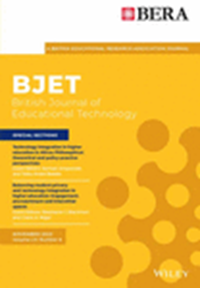Adoption of learning analytics in higher education institutions: A systematic literature review
Abstract
Learning analytics (LA) is an emerging area that has had extensive development in higher education in recent years, focused both on the learning process of students within subjects and on monitoring their trajectories in training programmes. However, most of the developments remain in the pilot phase without reaching institutional adoption. This paper reports the results of a systematic review of the literature carried out with the aim of identifying the factors that influence the adoption of LA, as well as the existing strategies that facilitate such adoption in higher education institutions. The results show that factors for LA adoption are situated in multiple dimensions, including stakeholders at different levels, institutional and pedagogical processes, technical limitations and ethical considerations. This work contributes with a consolidated list of 14 critical factors to be considered to effectively adopt LA tools, addressing planning, strong leadership, collaboration and prioritizing senior management commitment, goal setting, cross-organizational design, educational process redesign, system integration and legacy system linkage. On the other hand, a variety of frameworks, models and approaches are distinguished in the literature to help the adoption of LA, however, none of them cover all the factors involved in such adoption. Therefore, we provide a compilation of strategies that have been used in the literature to reduce the gaps associated with the different factors described.
Practitioner notes
What is already known about this topic
- LA is a field of research that has had a lot of interest and a wide variety of tools have been developed. Still, it is criticized that they originate more from data availability than from the needs of students, teachers and decision makers.
- LA tools are mostly evaluated on their usability aspects and to a lesser extent on their usefulness to impact learning processes.
- The adoption processes of LA in higher education are oriented to specific aspects such as the relevance of the visualizations in the different contexts of application, but they do not address extensively other important aspects involved in such adoption.
What this paper adds
- This article seeks to synthesize what has been investigated in the literature regarding the factors that affect the adoption of LA by higher education institutions.
- Describe the 14 critical factors identified from the literature to address adoption of multiple dimensions that include stakeholders at different levels, institutional contexts and ethical considerations.
- A compilation of strategies that have been used in the literature to reduce the gaps associated with the different factors are described, and the aspects or dimensions that are not addressed are highlighted.
Implications for practice and/or policy
- The synthesis of LA adoption factors and the approach strategies present in the literature allow practitioners to focus their efforts on the key aspects to consider in their LA adoption processes.
- Future work could shift from a pure design perspective to strengthen an engineering perspective in the adoption practices.
- From the point of view of the policies associated with the adoption of LA in higher education institutions, it is concluded that it is necessary to approach the process from a comprehensive perspective considering all the dimensions involved.

 求助内容:
求助内容: 应助结果提醒方式:
应助结果提醒方式:


